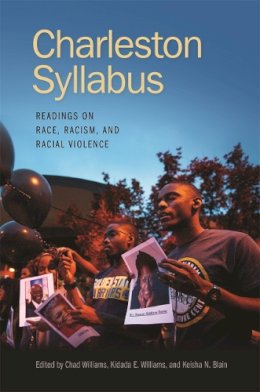
Charleston Syllabus: Readings on Race, Racism, and Racial Violence
On June 17, 2015, a white supremacist entered Emanuel AME Church in Charleston, South Carolina, and sat with some of its parishioners during a Wednesday night Bible study session. An hour later, he began expressing his hatred for African Americans, and soon after, he shot nine church members dead, the church’s pastor and a South Carolina state senator, Rev. Clementa C. Pinckney, among them. The ensuing manhunt for the shooter and investigation of his motives revealed his beliefs in white supremacy and reopened debates about racial conflict, southern identity, systemic racism, civil rights, and the African American church as an institution.
In the aftermath of the massacre, Professors Chad Williams, Kidada E. Williams, and Keisha N. Blain sought a way to put the murder—and the subsequent debates in the media—in the context of America’s tumultuous history of race relations and racial violence on a global scale. They created the Charleston Syllabus on June 19, starting it as a hashtag on Twitter linking to scholarly works on the myriad of issues related to the murder. The syllabus’s popularity exploded and is already being used as a key resource in discussions of the event.
Charleston Syllabus is a reader—a collection of new essays and columns published in the wake of the massacre, along with selected excerpts from key existing scholarly books and general-interest articles. The collection draws from a variety of disciplines—history, sociology, urban studies, law, critical race theory—and includes discussion questions and a selected and annotated bibliography for further reading, drawing from such texts as the confederate constitution, South Carolina's secession declaration, songs, poetry, slave narratives, and literacy texts. As timely as it is necessary, the book will be a valuable resource for understanding the roots of American systemic racism, white privilege, the uses and abuses of the Confederate flag and its ideals, the black church as a foundation for civil rights activity and state violence against such activity, and critical whiteness studies.
This book is dedicated to
Cynthia Hurd
Susie Jackson
Ethel Lance
DePayne Middleton-Doctor
Clementa Pinckney
Tywanza Sanders
Daniel Simmons Sr.
Sharonda Singleton
Myra Thompson
Product Details
About
Reviews for Charleston Syllabus: Readings on Race, Racism, and Racial Violence
Leslie M. Harris
author of In the Shadow of Slavery: African Americans in New York City, 1626-1863
Do inflamed emergencies tend to produce innovative scholarly responses? Even a glancing perusal of this enlightening and brilliant response to the Charleston massacre of 2015 leads inexorably to an emphatic answer: yes! These diligent scholars provide eye-opening historical and contemporary chapters that shed light on why this tragedy occurred—and what must be done to ensure that it will not recur.
Gerald Horne
author of The Counter-Revolution of 1776: Slave Resistance and the Origins of the United States of America
This thoroughly remarkable compendium of works about African-American life, edited by the three history professors who started the #CharlestonSyllabus Twitter hashtag, offers solid ground for the oft-requested national conversation about race. Their work firmly connects the dots among slavery, white terror organizations, the Confederate battle flag, and the murders of eight African-American Bible study members in Charleston, S.C., in 2015. . . . This solid offshoot of the original online syllabus (a blockbuster bibliographic tool that’s also included in this volume) is simply a must-read, both for those already versed in these topics and those just getting started.
Publishers Weekly (starred review)
Confronting domestic and global white supremacy, this provocative text documents and demonstrates what has been done and what needs doing nationally and internationally to realize racial justice and equality. It deserves reading and discussion by anyone interested in social transformation.
Library Journal
